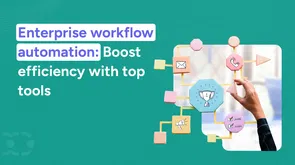In a world where customer expectations are constantly evolving, it’s crucial to keep up with the pace. To stay ahead, you need a faster solution, something that helps you eliminate time-consuming daily tasks more efficiently.
Especially in the retail market, retailers need to stay competitive and future-proof the retail operations with automation.
Automation in retail provides businesses with an edge to minimize manual errors, reduce overhead costs, and deliver personalized, seamless shopping experiences across multiple channels.
Adopting automation in the retail industry will help attract more Gen Z and millennials through different digital engagement strategies, as their spending is expected to grow in 2025.
Companies investing in advanced automation tools today are positioning themselves for a stronger future.
In this blog, we will explore the concept of retail automation, its advantages, strategies, and solutions to help you make informed decisions.
What is retail automation?
Automation in retail involves the integration of advanced technologies to streamline various day-to-day retail operations, enhancing efficiency and improving overall customer experiences.
It encompasses the use of AI-powered solutions to handle repetitive tasks prone to human error.
The different key components of automation in the retail sector involve:
- Self-checkout systems: Allow customers to scan and pay for items independently, reducing the need for cashier staff and speeding up the checkout process.
- Automated retail kiosks: Standalone machines that enable customers to purchase products without human assistance, often found in high-traffic areas like malls and airports.
- Point of sale (POS) systems: Advanced POS systems manage sales, inventory, and customer data, often utilizing cloud-based platforms for real-time analytics and remote access.
- Cashierless stores: Utilize sensors, cameras, and artificial intelligence to allow customers to shop and leave without traditional checkout processes, automatically charging them for items taken.
Advantages of automation in retail industry!
The global retail automation market has a compound annual growth rate of 12.5%. End-to-end automation in retail offers numerous benefits that appeal to businesses across the sector.
Here are a few for your benefit to the companies:
1) Low labor costs
The ability to reduce labor costs while maintaining or improving operational efficiency is a key advantage of using sales performance management tools.
Traditional retail operations rely heavily on human resources for inventory management, customer service, checkout processing, and order fulfillment.
Automation in retail tends to replace these manual processes, leading to significant cost savings and reduced employee workload.
Retail automation solutions eliminate the need for excessive staffing in certain areas.
For example:
- Self-checkout kiosks reduce the need for cashiers. Retailers like Walmart and Target have implemented automation through self-service systems, allowing fewer employees to manage checkout lanes.
- Robotic process automation in the retail industry through warehouses speeds up sorting, packing, and order fulfillment while reducing dependency on human workers.
2) Streamlined operations
Automation in the retail industry simplifies complex workflows, reducing manual effort and improving overall efficiency.
By integrating smart technologies like AI-driven inventory tracking, automated checkout systems, and real-time retail data analytics, businesses can eliminate bottlenecks and optimize daily operations.
Tasks that once required multiple steps, such as record-keeping, order processing, and returns management, can now be completed seamlessly with minimal human intervention.
Automation enables retailers to deliver consistent service quality, faster turnaround times, and uninterrupted operations 24/7, even outside business hours, with a personalized shopping experience.
3) Precision and accuracy
Automation with retail CRM software minimizes human errors by replacing manual, repetitive tasks with precise, technology-driven processes.
Fatigue, distractions, and oversight often lead to inventory tracking, billing, and reporting mistakes, which can be costly for retailers.
Automated retail technologies such as AI-powered inventory management and real-time data analytics ensure accuracy, consistency, and error-free operations.
By reducing reliance on manual input, businesses improve efficiency and decision-making and create a stress-free work environment for employees, leading to better productivity and fewer operational disruptions.
4) Enhanced CX
Automation in retail enhances customer satisfaction by delivering faster service, personalized interactions, and seamless shopping experiences.
The automated inventory systems give staff real-time product availability, while AI-powered marketing tailors recommendations based on customer preferences.
Self-checkout kiosks, chatbots, and 24/7 support ensure convenience and efficiency for customers.
5) Smart scalable growth
Automation in the retail sector adapts and scales effortlessly as they grow, ensuring seamless expansion without operational bottlenecks.
By automating workflows, businesses can handle increased sales volumes, optimize inventory management, and streamline customer interactions without additional resources.
AI-driven insights help retailers make data-backed decisions, improving efficiency and revenue generation.
Unlike manual processes that require constant restructuring, automation evolves with your business, allowing for smoother operations, higher profitability, and sustained growth.
6) Enhanced security
Automation in retail businesses strengthens security and fraud prevention by leveraging advanced technologies to protect sensitive customer and financial data.
Automated systems such as AI-powered fraud detection, encryption tools, and authentication scanners help retailers identify and prevent counterfeit transactions, return receipt fraud, and payment breaches.
Firewalls and real-time monitoring detect potential threats, ensuring immediate action against cyber risks.
7) Boost sales
The end-to-end automation in the retail domain provides real-time sales insights, market trend analysis, and sales forecasting, helping businesses make data-driven decisions to maximize sales.
Unlike traditional retail stores with limited hours, automated virtual stores operate 24/7, ensuring a continuous sales flow.
By streamlining checkout, inventory management, and personalized marketing, automation reduces friction in the buying process, improves customer satisfaction, and drives higher conversion rates, ultimately boosting overall sales and profitability.
Smarter strategies for better business process automation in retail!
Retail automation is not just about adopting the latest technologies; it's about optimizing workflows, empowering employees, and future-proofing operations.
Here are key strategies retailers can implement to maximize retail business processes impact:
-> Transforming with smart automation
Automation in retail transforms retail operations by enhancing efficiency and redefining roles. Tasks once handled manually, such as inventory tracking, order management, and customer support, are now streamlined with AI and robotics.
For example, shelf-scanning robots can replace routine stock-checking duties, allowing managers to focus on customer interactions and sales strategies. Retailers must align their operating models with this transformation to unlock automation's full potential.
-> Optimizing workforce allocation
Automation helps businesses redeploy employees to higher-value roles rather than replacing them.
For example, Best Buy introduced in-home advisors and total tech support roles, allowing staff to focus on customer engagement rather than routine store tasks.
Businesses can improve customer satisfaction and drive better revenue growth by reallocating time and expertise where it matters most.
-> Upskilling teams for better future impact
As automation reshapes retail, the demand for technological skills increases. Instead of hiring new talent, businesses can reskill their existing workforce to bridge the skills gap.
Walmart partnered with Guild Education to offer low-cost tuition programs, helping employees learn new automation-related skills.
Collaborating with educational institutions and providing on-the-job training ensures a future-ready workforce while reducing recruitment costs.
-> Redefining hiring strategies
With automation shifting job demands, retailers must broaden their hiring strategies to attract top tech talent.
Peapod, an online grocer, relocated its headquarters to Chicago, optimizing access to a skilled, college-educated workforce.
Additionally, gig workers, freelancers, and outsourced specialists can help retailers fill roles on demand, ensuring faster hiring and cost efficiency without long-term commitments.
-> Investing strategically
Streamline lead management by assigning fewer but more specialized roles can significantly improve sales performance. Retailers should invest in competitive wages and benefits to retain top talent while ensuring their workforce remains motivated and skilled.
Rather than reacting to market shortages, businesses should adopt proactive compensation strategies that align with the evolving retail landscape.
Examples of automation in retail stores!
Retail automation leverages advanced technologies to streamline operations, reduce costs, and enhance customer experiences. Here's how retail automation is transforming various aspects of the retail industry:
1) Inventory management
Effective inventory management is crucial for automation in retail sector success. Automation in this area involves using technologies like AI and robotics to handle tasks such as stock replenishment and real-time tracking. For example:
- John Lewis partnership: The UK retailer integrated autonomous robots into its warehouse operations, leading to significant cost savings and improved storage capacity, especially during peak shopping seasons.
2) Retail marketing
Automated retail marketing aims to enhance campaign effectiveness while saving time. Technologies such as AI and machine learning enable personalized customer interactions. For instance:
- Victoria's Secret: The fashion retailer utilized AI for customized email campaigns, significantly boosting marketing metrics.
3) Processing returns
With the growth of online shopping, efficient returns processing has become essential. Automation streamlines this process, reducing manual effort and improving customer satisfaction. For example:
- UK retailers: Companies are adopting automated returns machines to handle the increasing volume of online returns, thereby reducing labor costs and enhancing efficiency.
4) Outlet automation
Automating physical store operations enhances the shopping experience and optimizes store layouts. Technologies such as cashierless systems and AI-driven analytics are being implemented. For instance:
- Sam's Club: The retailer introduced a store featuring a checkout-free system, where customers use an app to scan and pay for items, streamlining the shopping process.
By embracing these automation technologies, retailers can optimize operations, reduce costs, and provide a superior customer experience.
Salesmate: Transform your business with retail automation!
For better retail automation, a tool like Salesmate is an up-to-date choice for every business size. Different features can ascertain it:
- Contact management: Get all the information of your retail customers in one place through connection management.
- Sales pipeline: Create a multiple sales pipeline and get a bird-eye view of every customer in the sales cycle.
- Smart emails: Take your email campaigns to the next level by creating retail automated emails for your business.
- Sales automation: With your retail sales team, you can help upgrade their productivity with the best tools available.
- Marketing automation: Manage everything from lead generation to sales forecasting through marketing automation in retail for your business.
- Reporting: Analyze your overall sales and marketing process by analyzing the reports for better strategies ahead of your business.







Key takeaways
In a world where customer expectations are constantly evolving, it’s crucial to keep up with the pace. To stay ahead, you need a faster solution, something that helps you eliminate time-consuming daily tasks more efficiently.
Especially in the retail market, retailers need to stay competitive and future-proof the retail operations with automation.
Automation in retail provides businesses with an edge to minimize manual errors, reduce overhead costs, and deliver personalized, seamless shopping experiences across multiple channels.
Adopting automation in the retail industry will help attract more Gen Z and millennials through different digital engagement strategies, as their spending is expected to grow in 2025.
Companies investing in advanced automation tools today are positioning themselves for a stronger future.
In this blog, we will explore the concept of retail automation, its advantages, strategies, and solutions to help you make informed decisions.
What is retail automation?
Automation in retail involves the integration of advanced technologies to streamline various day-to-day retail operations, enhancing efficiency and improving overall customer experiences.
It encompasses the use of AI-powered solutions to handle repetitive tasks prone to human error.
The different key components of automation in the retail sector involve:
Advantages of automation in retail industry!
The global retail automation market has a compound annual growth rate of 12.5%. End-to-end automation in retail offers numerous benefits that appeal to businesses across the sector.
Here are a few for your benefit to the companies:
1) Low labor costs
The ability to reduce labor costs while maintaining or improving operational efficiency is a key advantage of using sales performance management tools.
Traditional retail operations rely heavily on human resources for inventory management, customer service, checkout processing, and order fulfillment.
Automation in retail tends to replace these manual processes, leading to significant cost savings and reduced employee workload.
Retail automation solutions eliminate the need for excessive staffing in certain areas.
For example:
2) Streamlined operations
Automation in the retail industry simplifies complex workflows, reducing manual effort and improving overall efficiency.
By integrating smart technologies like AI-driven inventory tracking, automated checkout systems, and real-time retail data analytics, businesses can eliminate bottlenecks and optimize daily operations.
Tasks that once required multiple steps, such as record-keeping, order processing, and returns management, can now be completed seamlessly with minimal human intervention.
Automation enables retailers to deliver consistent service quality, faster turnaround times, and uninterrupted operations 24/7, even outside business hours, with a personalized shopping experience.
3) Precision and accuracy
Automation with retail CRM software minimizes human errors by replacing manual, repetitive tasks with precise, technology-driven processes.
Fatigue, distractions, and oversight often lead to inventory tracking, billing, and reporting mistakes, which can be costly for retailers.
Automated retail technologies such as AI-powered inventory management and real-time data analytics ensure accuracy, consistency, and error-free operations.
By reducing reliance on manual input, businesses improve efficiency and decision-making and create a stress-free work environment for employees, leading to better productivity and fewer operational disruptions.
4) Enhanced CX
Automation in retail enhances customer satisfaction by delivering faster service, personalized interactions, and seamless shopping experiences.
The automated inventory systems give staff real-time product availability, while AI-powered marketing tailors recommendations based on customer preferences.
Self-checkout kiosks, chatbots, and 24/7 support ensure convenience and efficiency for customers.
5) Smart scalable growth
Automation in the retail sector adapts and scales effortlessly as they grow, ensuring seamless expansion without operational bottlenecks.
By automating workflows, businesses can handle increased sales volumes, optimize inventory management, and streamline customer interactions without additional resources.
AI-driven insights help retailers make data-backed decisions, improving efficiency and revenue generation.
Unlike manual processes that require constant restructuring, automation evolves with your business, allowing for smoother operations, higher profitability, and sustained growth.
6) Enhanced security
Automation in retail businesses strengthens security and fraud prevention by leveraging advanced technologies to protect sensitive customer and financial data.
Automated systems such as AI-powered fraud detection, encryption tools, and authentication scanners help retailers identify and prevent counterfeit transactions, return receipt fraud, and payment breaches.
Firewalls and real-time monitoring detect potential threats, ensuring immediate action against cyber risks.
7) Boost sales
The end-to-end automation in the retail domain provides real-time sales insights, market trend analysis, and sales forecasting, helping businesses make data-driven decisions to maximize sales.
Unlike traditional retail stores with limited hours, automated virtual stores operate 24/7, ensuring a continuous sales flow.
By streamlining checkout, inventory management, and personalized marketing, automation reduces friction in the buying process, improves customer satisfaction, and drives higher conversion rates, ultimately boosting overall sales and profitability.
Smarter strategies for better business process automation in retail!
Retail automation is not just about adopting the latest technologies; it's about optimizing workflows, empowering employees, and future-proofing operations.
Here are key strategies retailers can implement to maximize retail business processes impact:
-> Transforming with smart automation
Automation in retail transforms retail operations by enhancing efficiency and redefining roles. Tasks once handled manually, such as inventory tracking, order management, and customer support, are now streamlined with AI and robotics.
For example, shelf-scanning robots can replace routine stock-checking duties, allowing managers to focus on customer interactions and sales strategies. Retailers must align their operating models with this transformation to unlock automation's full potential.
-> Optimizing workforce allocation
Automation helps businesses redeploy employees to higher-value roles rather than replacing them.
For example, Best Buy introduced in-home advisors and total tech support roles, allowing staff to focus on customer engagement rather than routine store tasks.
Businesses can improve customer satisfaction and drive better revenue growth by reallocating time and expertise where it matters most.
-> Upskilling teams for better future impact
As automation reshapes retail, the demand for technological skills increases. Instead of hiring new talent, businesses can reskill their existing workforce to bridge the skills gap.
Walmart partnered with Guild Education to offer low-cost tuition programs, helping employees learn new automation-related skills.
Collaborating with educational institutions and providing on-the-job training ensures a future-ready workforce while reducing recruitment costs.
-> Redefining hiring strategies
With automation shifting job demands, retailers must broaden their hiring strategies to attract top tech talent.
Peapod, an online grocer, relocated its headquarters to Chicago, optimizing access to a skilled, college-educated workforce.
Additionally, gig workers, freelancers, and outsourced specialists can help retailers fill roles on demand, ensuring faster hiring and cost efficiency without long-term commitments.
-> Investing strategically
Streamline lead management by assigning fewer but more specialized roles can significantly improve sales performance. Retailers should invest in competitive wages and benefits to retain top talent while ensuring their workforce remains motivated and skilled.
Rather than reacting to market shortages, businesses should adopt proactive compensation strategies that align with the evolving retail landscape.
Manage your retail store effortlessly with Salesmate!
Automate orders, track performance, and streamline customer interactions all in one plac
Examples of automation in retail stores!
Retail automation leverages advanced technologies to streamline operations, reduce costs, and enhance customer experiences. Here's how retail automation is transforming various aspects of the retail industry:
1) Inventory management
Effective inventory management is crucial for automation in retail sector success. Automation in this area involves using technologies like AI and robotics to handle tasks such as stock replenishment and real-time tracking. For example:
2) Retail marketing
Automated retail marketing aims to enhance campaign effectiveness while saving time. Technologies such as AI and machine learning enable personalized customer interactions. For instance:
3) Processing returns
With the growth of online shopping, efficient returns processing has become essential. Automation streamlines this process, reducing manual effort and improving customer satisfaction. For example:
4) Outlet automation
Automating physical store operations enhances the shopping experience and optimizes store layouts. Technologies such as cashierless systems and AI-driven analytics are being implemented. For instance:
By embracing these automation technologies, retailers can optimize operations, reduce costs, and provide a superior customer experience.
Salesmate: Transform your business with retail automation!
For better retail automation, a tool like Salesmate is an up-to-date choice for every business size. Different features can ascertain it:
Transform your retail business with Salesmate's smart automation!
Boost efficiency, reduce costs, and enhance customer experiences with cutting-edge retail automation
Wrap up!
Automation in retail is undergoing a massive transformation with AI and other analytics. By integrating smart technologies, businesses can streamline operations, reduce costs, enhance customer experiences, and scale efficiently.
Whether AI-powered inventory management, self-checkout systems, or automated marketing, the right automation strategy can unlock new growth opportunities.
Keeping up with emerging trends and technologies is crucial to stay ahead in this competitive landscape. If you want to digitize and automate your retail processes, now is the time to take action.
Frequently asked questions
1. How is automation used in retail?
Automation in retail leverages advanced technologies to streamline operations, enhance customer experiences, and improve efficiency. Besides, key applications include:
2. Which retail processes can be automated?
Intelligent automation in retail industry can optimize several processes, improving operational efficiency and reducing operational costs. Here are a few key automation in the retail sector:
3. Are there challenges associated with retail automation?
The business process automation in retail comes with several challenges that businesses must navigate:
4. What does the future hold for automation in retail?
The future trends in retail automation are posed to bring transformative changes across various facets of the industry, driven by technological advancements and evolving customer expectations. Key developments of automation in retail include:
Juhi Desai
Content WriterJuhi is a passionate writer and reader. She is working with the team of content creators at Salesmate. Always seeking to learn something new, Juhi has an optimistic approach towards life. When she is not writing you can find her with a book and a coffee by her side.